Today we are talking about a holistic approach of wellbeing as we have shed focus not only on seafarers’ mental health but also seafarers’ physical health and social life onboard and overall, on seafarers’ happiness. There are many factors that can improve the quality of life onboard and ensure a happier crew. With that in mind, latest SAFETY4SEA survey, revealed many mental health barriers as well as that physical wellbeing is the most ignored among other aspects.
The 2023 SEAFiT Crew survey, which is the largest survey on crew welfare conducted worldwide with the participation of 1.6K ships and 19K seafarers, highlighted as a key outcome that the internet plays a vital role for life onboard. Over 70% of the crew members do not experience difficulties in establishing good relationships with their colleagues and rely on high-quality internet access to maintain connections and communicate with their loved ones back on land, a need expressed by an astounding 91% of participants. Also, the survey brought to light several critical concerns that the industry has not given priority to in terms of seafarer wellness, including issues related to wages and shore connectivity. It underscored that the industry tends to react to problems rather than taking a proactive approach.
The survey took place during Q1 & Q2 of 2023, asking from people onboard and ashore to provide feedback on how they perceive several wellness/ wellbeing factors regarding their work and life at sea. In particular, participants were asked to answer questions that cover the following key aspects of crew welfare: Wellness; Communication on Physical/Mental health; Wellbeing Factors During onboard; Happiness issues; Physical Wellbeing issues; Mental Health Barriers and; Social Wellbeing Barriers.
The survey questionnaire was answered by a total of 18,352 Seafarers, serving on board 1,574 Ships. The majority of nationalities came from Asia and Europe and the majority of participants were from Philippines (37.3%). Other countries with high participation were Ukraine, India and Georgia. (Graph 1). The ship category that involved the majority of participants was ‘Bulk Carriers’, as they form the 31.7 % of the fleet involved. (Graph 3).

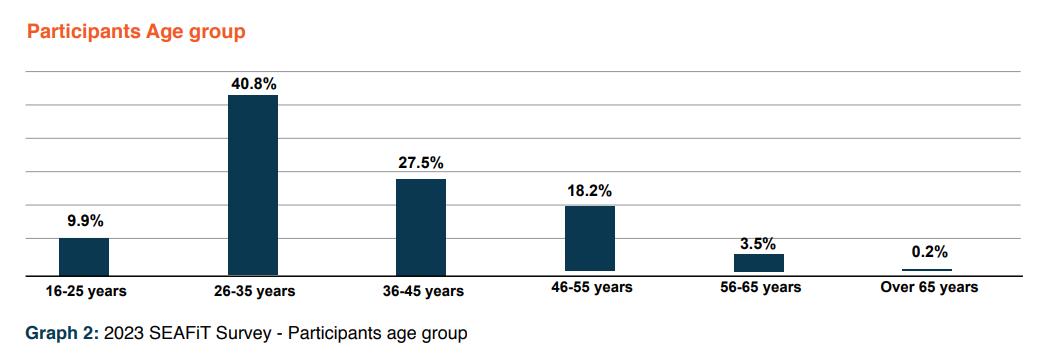

Key Findings
- Welfare on board is defined by a variety of factors; many critical elements regarding life onboard are at satisfactory levels. In particular, the overall Crew Wellness Index – the SEAFiT Index – revealed that satisfaction level is at 2%, higher than 2021 (71.2%).
- The 2023 SEAFiT Index assessed the satisfaction level of the following: Wellness Index (WNI 80.5%), Communication Index (CMI – 76.9%), Happiness Index (HPI – 73.8%) and Wellbeing Index (WBI -65.5%).
- The satisfaction level of Mental Wellbeing Index in 2023 showed a decrease in comparison with previous years (Graph 5). The survey highlighted many Mental Health Barriers (Table 2), revealing as three top barriers being: the absence of information about symptoms linked to mental health concerns (58.8%); inadequate healthcare coverage for mental health issues (59.8%); and a lack of guidance on coping strategies for mental health challenges (60.5%).
- The satisfaction level of Physical Wellbeing Index in 2023 showed significant reduction in comparison with previous years (Graph 5). Among many reasons, this can be attributed to the prolonged duration of the pandemic, along with the challenges of being at sea for extended periods which increased stress and mental health issues among seafarers. This, in turn, negatively impacted their physical wellbeing and satisfaction.
- Communication with home is the number one priority for seafarers. Despite the satisfaction in relevant Question (90.4%), seafarers still require more internet privileges on board.
- Recreational facilities are at the same level of concern for seafarers, as the physical wellbeing and onboard time for relax plays a significant role to their satisfaction and their ability to prepare themselves for the demanding daily program.
- Wages and bonus are also very high in seafarers’ agenda with satisfaction level in relevant Question up to 63.2%
- Other issues of high importance for seafarers are Increased Workload, Shore Leave Issues, Food/Water Quality-Quantity and Career Development.
In summary, the survey revealed a shift in seafarers’ priorities, with health concerns, which were paramount during the COVID-19 pandemic, now being less prominent in their daily worries. Despite improvements in connecting seafarers with their homes while on board, there are ongoing complaints about inadequate Internet connectivity and communication with people onshore.
Wages and salaries continue to play a crucial role in seafarers’ overall wellbeing. The majority of respondents expressed a strong need for enhanced recreational activities and mental support while at sea. Significant attention was directed toward strategies to improve mental, physical, and social wellbeing, such as scheduling meetings to share resilient best practices, enhancing recreation facilities and nutrition, and organizing onboard activities.
In terms of crew satisfaction, the survey findings indicate that factors such as ship age and type exert a significant influence. In general, male seafarers tend to report higher levels of satisfaction compared to their female counterparts. Among nationality groups, Filipino seafarers exhibit the highest satisfaction levels, while Italian seafarers appear to be the least content. In terms of age groups, those aged 36-55 express the highest satisfaction, while those over 60 are the least satisfied. When it comes to departments, the catering department reports the highest satisfaction, followed by the engine and deck departments, in that order. Interestingly, officers tend to report lower levels of satisfaction compared to ratings. The survey also reveals that crews serving on tankers tend to be the most content, while those on general cargo ships are the least satisfied. On the whole, seafarers serving on Gas Carriers tend to be the most satisfied.
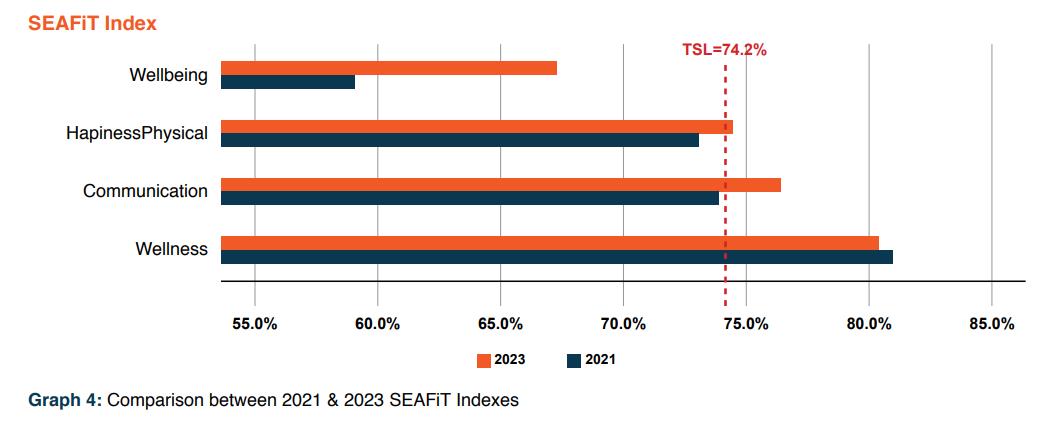
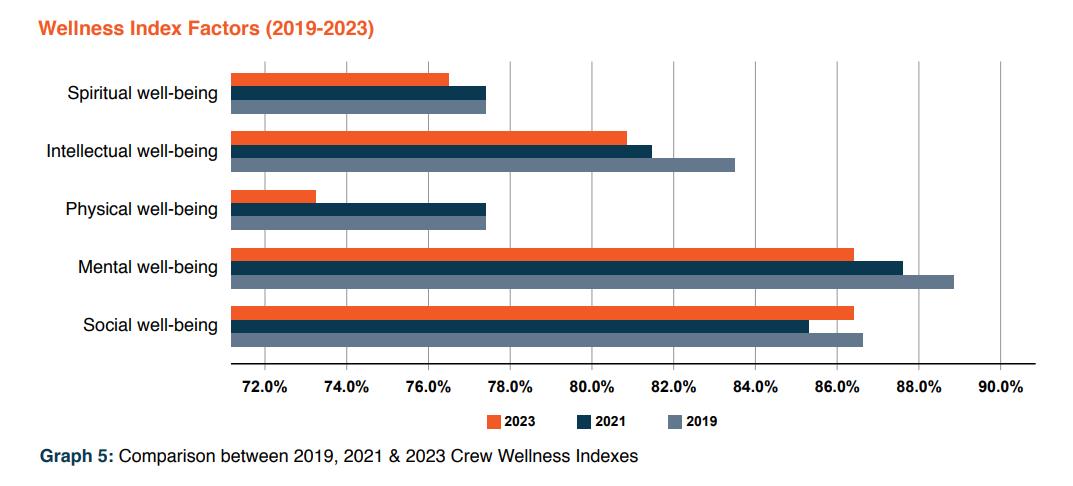
Key areas of concern
In open feedback questions, the participants identified that the following key items need to be addressed thoroughly for immediate solutions:
- Increased Work Load
- Shore Leave Issues
- Food/Water Quality-Quantity
- More focus on safety issues onboard
- Career Development
- Contract termination/Repatriation
- Increased salary and bonus
- Need for mental support on board
- Focus on keeping human factor resilient
- Improvement in the recreation facilities onboard
- Free Internet to enhance communication with families/friends
Several seafarers highlighted that affordable means of communication, i.e. free internet data package, would improve the communication with their beloved ones ashore and subsequently their wellbeing significantly. The internet is not only seen as a tool for communication but also as a source of leisure and entertainment for seafarers. It plays a dual role in helping them connect with loved ones and providing recreational activities. Seafarers are quite concerned about having access to high-quality internet connectivity. This indicates that the reliability and speed of the internet connection are crucial factors in their satisfaction and wellbeing. The satisfaction ratings in related Questions highlight the importance of addressing these communication and connectivity needs, to enhance the overall wellbeing of seafarers.
There were many respondents who touched the issue of focusing more on social life onboard and investing in team bonding activities, i.e. karaoke nights, BBQ Sundays onboard, games. Furthermore, many participants asked for a healthier nutrition rich in fruits and vegetables, recreational facilities and gym equipment for exercise.
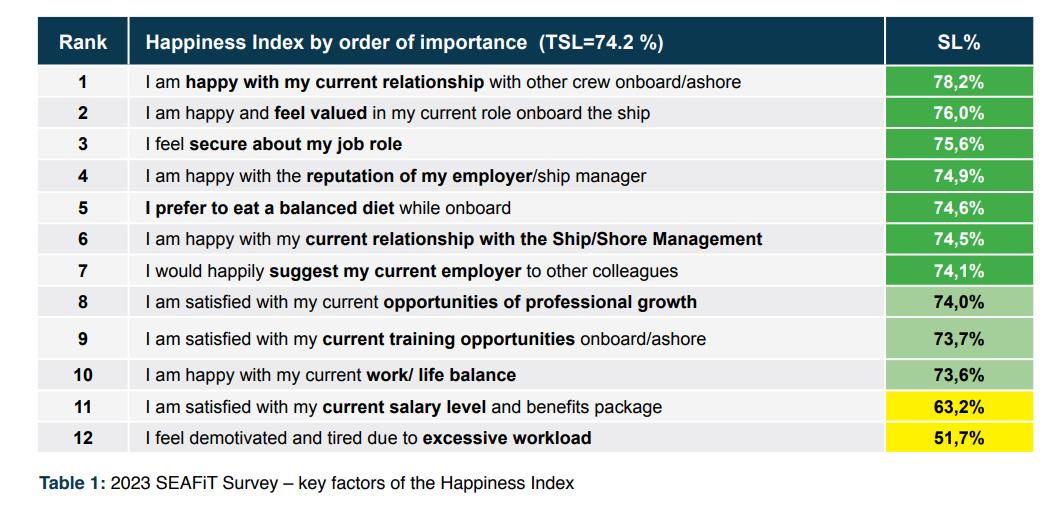
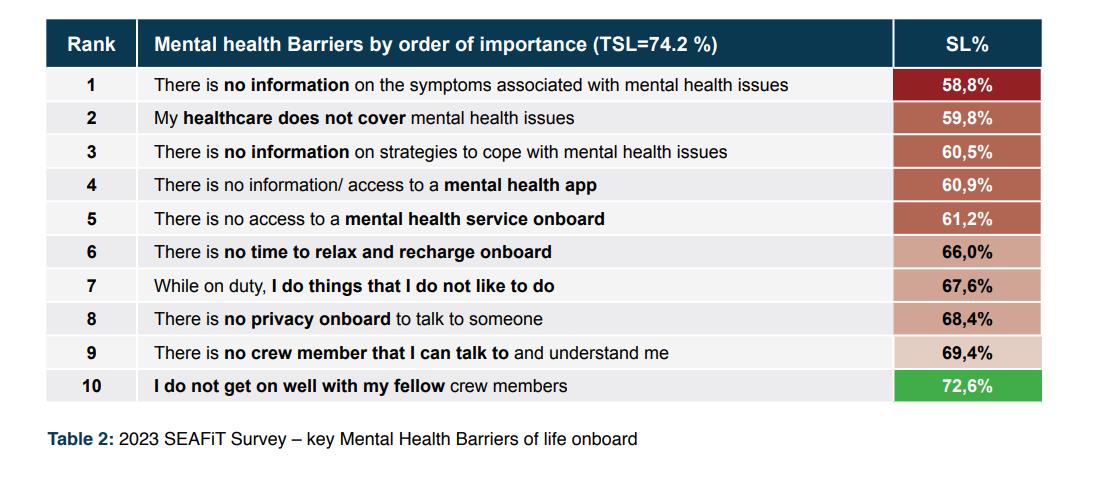
Open feedback question revealed concerns related to human factor, requiring training on mental health issues, resilience meetings, mental health support by experts and a robust health care system onboard and ashore, providing health support. What is more, several participants highlighted how important is for the ship management to check crew mental health on a timely manner and suggested medical insurance to the family onshore.
Contracts termination/ repatriation and shore leave were also among seafarers’ high concerns as a result of the COVID-19 pandemic and crew change challenges. The contracts and repatriation routine has almost returned to pro COVID levels, however the restrictions in shore leave is an issue that requires further discussion by industry stakeholders.
Overall, crew welfare issues are being successfully addressed according to the Crew Welfare Index of the survey which remains at a high level 74,2%. Although, the wellness issues (related to aspects of social, emotional, physical, intellectual and spiritual wellbeing) show a high satisfactory level for crew onboard, seafarers felt that communication with each other and the demanding work load affect their wellbeing overall.






























































